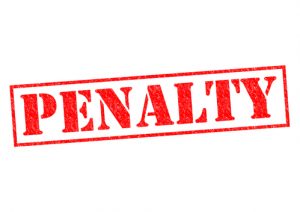Penalties
A truck driver who fails to get a permit and who is operating a vehicle that exceeds the legal limit for weight will be subject to a penalty calculated by deducting the statutory limit for weight from the actual vehicle weight. The rate of the fine shall be fifteen dollars per one hundred pounds or fraction thereof of excess weight.
Any vehicle in violation of any permit standards, or functioning without a permit where one is requested, will be required to correct all offending irregularities or get a new permit based on the vehicle’s actual load prior to the release of the vehicle.
In addition, the following penalties will apply for violations of permit requirements:
- An oversize or overweight vehicle operating without a permit will have penalties assessed.
- A vehicle operated with a legal permit which:
- Exceeds the weight standards contained in the permit. A penalty will be assessed for every pound or portion thereof exceeding the permitted weight.
- Exceeds the dimensional criteria contained in the permit. A penalty will be assessed for every foot or portion thereof exceeding the permitted dimension.
- Has a valid permit but the vehicle violates an operational or safety provision contained in the permit. A penalty will be assessed of $100 per safety violation (lights, flags, signs, etc.) and $250 per absent escort, though the total penalty for the vehicle shall not exceed $1,000.
- Violates daytime, nighttime, or restricted hours of travel restrictions shown on the permit. This includes any weekend and holiday travel restrictions shown on the permit, as well as restrictions against movement during periods of poor visibility. A penalty will be assessed of $1,000 and the vehicle will be parked at the owner’s expense and responsibility until the next authorized travel period.
3. Any vehicle that bypasses an open weigh station will be assessed a penalty of $1,000.
Null and Void Criteria
Any vehicle found to be operating under one or more of the following conditions:
- The vehicle has an expired permit. A penalty is to be assessed for both weight and size.
- The vehicle is not on the route designated on the permit or on an approved route on the multi-trip permit attachments. A penalty is to be assessed for both weight and size as well.
- The vehicle is a self-propelled truck crane towing a motor vehicle that exceeds the 5,000-pound limit. A penalty is to be assessed for weight only.
- The vehicle is operating with a permit that has been altered or forged. A penalty is to be assessed for both weight and size.
- The vehicle is not as represented by the facts on the permit. A penalty is to be assessed for both weight and size. This violation will not be applicable if it duplicates another violation noted in a specific citation.
- The vehicle contains multiple loadings (except as allowed per this rule). A penalty is to be assessed based upon the nature of the violation (weight or size).
- The vehicle was operating during nighttime hours when not allowed by the permit or its attachments. A penalty is to be assessed for size only.
- The tires on the vehicle are smaller than those specified on the permit. A penalty is to be assessed for size only.
- The vehicle has an outer-bridge dimension which is less than the minimum specified on the permit. A penalty is to be assessed for weight only.
- The vehicle is being operated under a multi-trip permit and the permit is not accompanied by the attachments described in the permit. A penalty is to be assessed based upon the nature of the violation (weight or size).
NON-COMPLIANCE
Suspension or revocation of permits
The Department of Transportation, for good cause, will suspend for a specified period of time or revoke a multi-trip or trip permit. “Good cause” shall include but not be limited to the following:
The permittee:
- fails to comply with the regulations of this rule.
- has submitted a false, deceptive, or fraudulent permit application.
- fails to comply with the terms of the permit.
- travels on any route other than the approved route.
- fails to submit a list of specified routes over which the load can or cannot travel when required.
- fails to pay fees/penalties owed to the Department or its agent(s).
- has been placed out-of-service based upon a compliance review performed by Motor Carrier Compliance.
- operates after the DOT determines that continued operation under an existing valid permit poses a safety issue for state-owned bridges or roadways.



